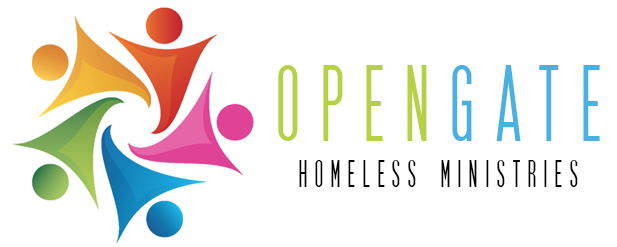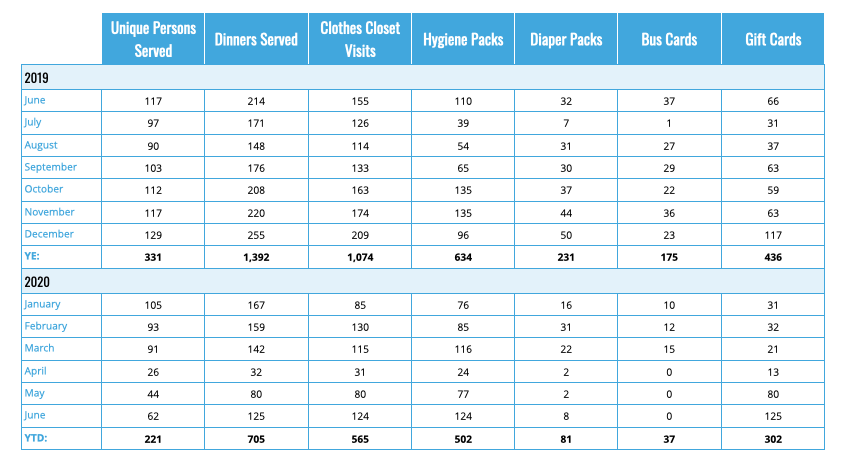COVID-19 has significantly affected Open Gate. Rather than ceasing operation, Open Gate is operating on a take-out basis, maintaining 13 years of never failing to be open on a Sunday. This reïnforces for our young-adult participants our dedication to not fail to support them, even in difficult times. Because so many adults have failed them during their lives, one of Open Gate’s founding principles is that we would not also fail them.
Those particularly affected are our participants living on the streets, which seems to be the core group we are currently serving. They are supported with meals (plus seconds), water, hygiene packs, underwear and socks, Kroger gift cards, diapers, rest-room access, and having their temperatures taken. Since Metro stopped collecting bus and train fares, we did not distribute Metro Q bus cards until mid-July when fares resumed. We are modeling social distancing and safe practices and are giving participants face masks and hand sanitizer. Participants can also let us know if they need special assistance. Unfortunately, social distancing has stopped entrance interviews for first-time participants.
Open Gate was to implement a program in the summer to assist participants obtain their high school GED (General Education Diploma). The program has been paused by COVID-19. Because we are operating on quick-entry–quick-exit basis, we do not have a body of participants to whom to offer the program. Furthermore, as the church is closed until at least fall, its facilities, e.g., Wi-Fi and a place to take classes, are not available. Until recently, Houston Community College (HCC), which offers the best GED class option for us, was closed; it is now resumed with online classes. Operation ID, which helps participants get proper identification documents, is not open. And neighborhood childcare options are closed. However, we have identified several participants who could begin their GED studies in the next HCC term, and we have one participant who is already taking online college classes at HCC. Open Gate provided her with a laptop.
Our fellow organizations serving homeless young adults are also affected: Montrose Grace Place; Tony’s Place; and Stand Up for Kids. We have shared food, snacks, water, face masks, and sanitizer with them. In particular, we provided meals every other week to Tony’s Place, which was doing street outreach since they could not operate their drop-in center.
The following table shows our service statistics for this year, with before and during COVID-19 and statistics from last year for comparison:
Financially, our actual June expenses were 51% less than budget, our actual income was, unfortunately, only 30% of budget. Since Bering and other organizations are closed, we have no income from altar-rail collections, third-party fundraisers, or Second Blessings, Bering’s resale ministry.
It remains to be seen, however, what the next several months will bring. It is our hope that we will be able to fully start the education program and resume special participant assistance, such as helping participants return to their families. We hope that not ceasing operations will demonstrate to our participants that we will not fail to support them, especially during the COVID-19 pandemic. Consequently, we hope that our keeping in contact with our participants will continue into the post-COVID-19 emergency and enable us to continue building trust and community with them, and to provide nonemergency support. We can resume our interviewing participants concerning their living situations, life histories, and needs.
Finally, when the emergency ends, we will be able to offer two coöperative programs that are now on hold. One is a job apprenticeship program in partnership with Goodwill. The other is a substance-abuse and mental-health program in partnership with UTHealth’s HEARTS program (McGovern Medical School).

